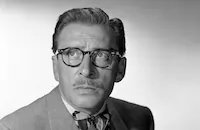The Man Who Dared: An Imaginative Biography
Cast & Crew
Hamilton Macfadden
Preston Foster
Zita Johann
Joan Marsh
Irene Biller
Clifford Jones
Film Details

Synopsis
In 1871, Bohemian immigrants Yosef and Tereza Novak bring their infant son Jan to the United States. On their way to Chicago, a man swindles them by selling them fake citizenship papers, and further misfortune strikes when their train cannot stop in Chicago because of a huge fire. On the advice of the conductor, the Novaks settle in nearby Braidwood, where Yosef becomes a coal miner. In 1880, Yosef advises Jan to study hard so that he can take advantage of the opportunities provided by America. Later that day, however, Yosef is killed in a mine explosion, and Jan is forced to work to support his mother and two sisters, Ruzena and Katie. Twelve years later, Jan is fired for asking for a raise, after which he walks to Chicago to begin a new life. Jan works hard and, while becoming a successful peddler, makes the acquaintence of Teena Pavelic, a waitress in the café of Viktor Posilipo. Viktor helps Jan defeat his rivel, Karel, in their struggle for Teena's affections, and soon the young couple are wed. Their first daughter is born at the time of the Spanish-American War, and while the Novaks are celebrating, local Senator John McGuiness worries about garnering the immigrant vote. One of his men, Dan Foley, suggests that he cultivate Jan, who is a leader in the Bohemian community. McGuinness and Foley persuade Jan to work for their party and, after Jan helps defeat Judge Collier, a McGuinness rival, he becomes an important district leader. Later, around the time of the assasination of President William McKinley, Jan is elected state senator and runs afoul of other political leaders when he refuses to introduce martial law to suppress a miners' strike. Jan fights for the miners and enables them to win the right to have their dispute settled by arbitration. In 1912, after President Woodrow Wilson is elected president, McGuinness reprimands Jan for not supporting his bill to repeal the civil service, but Jan declares that the civil service should be reformed instead. Jan's liberal views keep him in constant conflict with his former cronies, but his family life continues to bring happiness as his daughter Joan marries her sweetheart Dick. Dick fights in World War I, and while the war is being waged, Jan fights against Prohibition, which he believes is not fair to enact while the soldiers are gone and cannot vote and will lead to a rise in organized crime. Although Jan loses the election for United States Senator, he eventually becomes the first foreign-born mayor of Chicago. Tragedy strikes, however, when Teena dies on the night of the election. Jan then devotes all of his energy to rid Chicago of crime and to prepare the city for the next world's fair. He reminisces about going with Teena to the previous Chicago world's fair, forty years earlier, and decides to invite President-Elect Franklin Delano Roosevelt to the festivities. Jan travels to Miami to meet with Roosevelt, and there he is shot by an assassin who is attempting to kill the president-elect. As Jan lays dying, he tells Roosevelt that he is glad it was himself who was shot, rather than the leader of his adopted country.

Director
Hamilton Macfadden
Cast

Preston Foster

Zita Johann

Joan Marsh
Irene Biller
Clifford Jones

June Vlasek

Leon Ames
Douglas Cosgrove

Douglas Dumbrille
Frank Sheridan
Leonid Snegoff
Elsie Larson
Lita Chevret
Vivian Reid
Matt Mchugh
Jay Ward
Crew
Bill Abbott
Duncan Cramer
Al Degaetano
Milton Gold
E. F. Grossman
Samuel Kaylin
Joe La Shelle
Arthur Miller
Dudley Nichols
Ed O'fearna
Royer
Lamar Trotti
Sol M. Wurtzel

Film Details

Quotes
Trivia
Notes
The working title of this film was The American, and it was based on the life of Anton Cermak. Cermak, an immigrant from Bohemia, was Chicago's first foreign-born mayor. He was shot by Italian anarchist Giuseppe Zangara on February 15, 1933, when Zangara attempted to assassinate President-Elect Franklin Delano Roosevelt in Miami. When Cermak died nineteen days later, Zangara was sentenced to the electric chair and was executed on March 20, 1933. The film's file in the MPAA/PCA Collection at the AMPAS Library contains a review by PCA staff member Vincent G. Hart, who stated: "Mr. Cermak's life is not overdone, and care has been taken not to emphasize the fatal shooting, which is a duplicate of the newsreels of the tragedy. The use of the President in this scene has been very carefully handeled, and only the hands of the imaginary President are shown, which takes care of any objection."
The Man Who Dared was the first screenplay written by Lamar Trotti, who was formerly the aid of Colonel Jason S. Joy of the MPAA. It was also the first of seven scripts on which Trotti and former New York World reporter Dudley Nichols collaborated. Plans for this biography were announced as early as March 10, 1933 by producer Sol Wurtzel, who stated that Nichols and Trotti had been working on the script since the shooting occurred. The part of "Jan Novak" was originally assigned to Spencer Tracy. According to a Los Angeles Times news item, Tracy asked to be removed from the cast so that he could instead star in The Power and the Glory (see AFI Catalog of Feature Films, 1931-40; F3.3506). The news item also noted that Victor Jory was to have been in the cast, but was instead placed by Fox in The Devil's in Love (see AFI Catalog of Feature Films, 1931-40; F3.1039). A Film Daily news item announced that Frank Conroy was signed for a role in the picture, but his participation in the completed film has not been confirmed. An earlier assassination plot against Cermak was the subject of a two-part episode of the ABC television series The Untouchables, which was broadcast in the 1959-1960 season.












